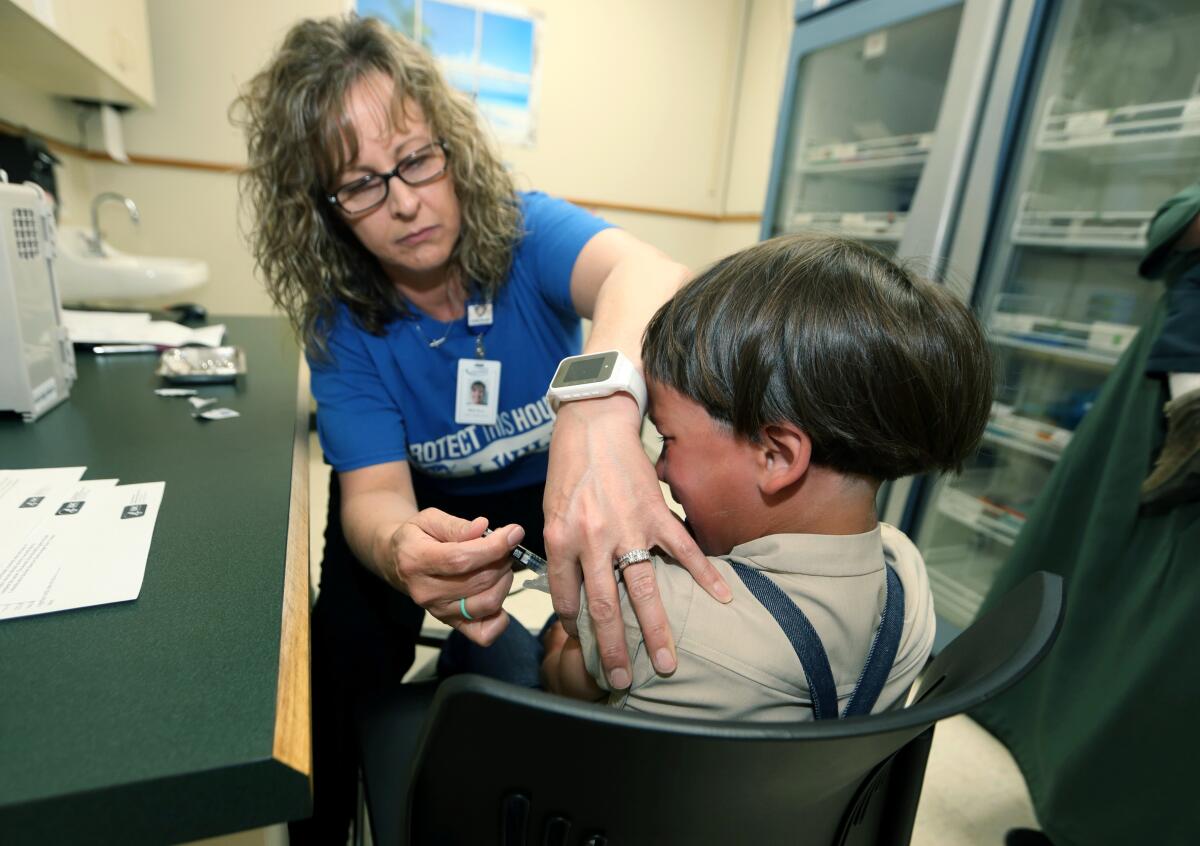Apodaca: Misinformation about vaccines appears to be contagious

- Share via
Anti-vaccine ideology is at or near the top of the list of subjects that I wish I didn’t feel compelled to write about. I wish that this dangerous trend would simply go away, as it should.
But it hasn’t. Quite the opposite. It continues to grow, thanks in large measure to the misguided panic over COVID-19 vaccines that supercharged suspicions about all vaccines and public health measures generally.
And now, tragically, we have further evidence that widespread misinformation and the resulting distrust about vaccines are leading to real-world consequences.
Last month, both the Centers for Disease Control and Prevention and the American Medical Assn. issued similar pleas — they were practically begging, folks — to those who remain unvaccinated for the measles virus to get the shot.
Why did they feel the need to make such strong statements about a disease that was once considered eliminated in the U.S.? Because more people are shunning vaccines, not just for themselves but for their children. The share of kindergartners who have received the measles-mumps-rubella (MMR) vaccine — a closely tracked data point — has declined nationwide, from the 95% rate that protects against community spread, to 93%.
That might not seem like much, but it’s enough of a decrease in protection to allow a worrying bump up in the number cases of this highly contagious virus to develop just as the spring travel season was getting underway, adding to the risk. And it doesn’t even account for children who are too young for school, many of whom have not received the full schedule of recommended vaccines.
At least 60 measles cases nationwide were identified in the first three months of the year, with that tally already surpassing the total number for all of 2023. Nearly all the cases were linked to unvaccinated U.S. residents who had traveled abroad and brought the virus home with them, thus introducing it into local communities where other unvaccinated people are highly vulnerable, raising the odds that more localized outbreaks will soon occur.
AMA President Jesse Ehrenfeld, in a statement urging people to be current on vaccinations, stressed that “when individuals are not immunized as a matter of personal preference or misinformation they put themselves and others at risk of disease — including children too young to be vaccinated, cancer patients, and other immune compromised people.”
California has not been exempt from this troubling trend, even though our vaccination rate among kindergartners remains higher than the national rate. As of March 20, five confirmed cases were reported in California, according to the state Department of Public Health.
About nine years ago, you may recall, at least 131 California residents were infected in a measles outbreak that was centered around Disneyland. Some residents of other states who visited the theme park at the same time were also infected. And in 2019, there were a spate of outbreaks throughout the state, with many of the cases also linked to international travel.
Following the Disneyland outbreak, California tightened its requirements regarding vaccinations for public school students by eliminating exemptions based on personal or religious beliefs and allowing them only for medical reasons. As a result, the overall vaccination rate for kindergartners increased.
Though the origins of a roughly 2.5-mile-long oil slick off the coast aren’t clear, the threat of another disaster is a call to action, writes Daily Pilot columnist Patrice Apodaca.
But there remain pockets throughout the state where vaccination rates are frighteningly low. The California Department of Public Health is auditing several hundred schools that have failed to meet the recommended level of fully vaccinated students, including 50 in Orange County.
For anyone who feels tempted to believe the misinformation that proliferates on the internet, on social media, and through word of mouth, let’s be clear about the facts: Vaccines are the greatest public health success story of modern times. They have greatly reduced the prevalence, or in some cases entirely eliminated, terrible diseases, thus saving millions of lives.
The measles vaccine in particular is safe and highly effective. The CDC recommends that the first dose of MMR be given when a baby is about 1 year old, and a second dose at 4 to 6 years of age.
The virus the vaccine protects against is one of the most contagious known to humankind. The disease it causes should not be underestimated.
Droplets of the measles virus can linger in airspace for up to two hours, and up to 90% of unvaccinated people who are exposed will contract it. One-fifth of them will be hospitalized. One in 20 infected children will develop pneumonia. Encephalitis, a brain-swelling condition, can also occur, as can hearing loss, intellectual disabilities and immune-system disorders that can last for many years. A few children will die from the disease.
A disease, I remind you, that is entirely preventable.
That’s why every time I read about an outbreak or hear about parents who have bought into discredited theories and decided to forgo or delay the recommended vaccines for their children, I feel the need to plead once again.
Facebook and Instagram are lousy places to get medical advice. An anecdote about a friend’s cousin’s former roommate doesn’t negate decades of data about vaccine safety and efficacy. Conspiracy mongers thrive on fear, not facts.
Shut out the noise and embrace the simple truth. Vaccines work.
All the latest on Orange County from Orange County.
Get our free TimesOC newsletter.
You may occasionally receive promotional content from the Daily Pilot.





